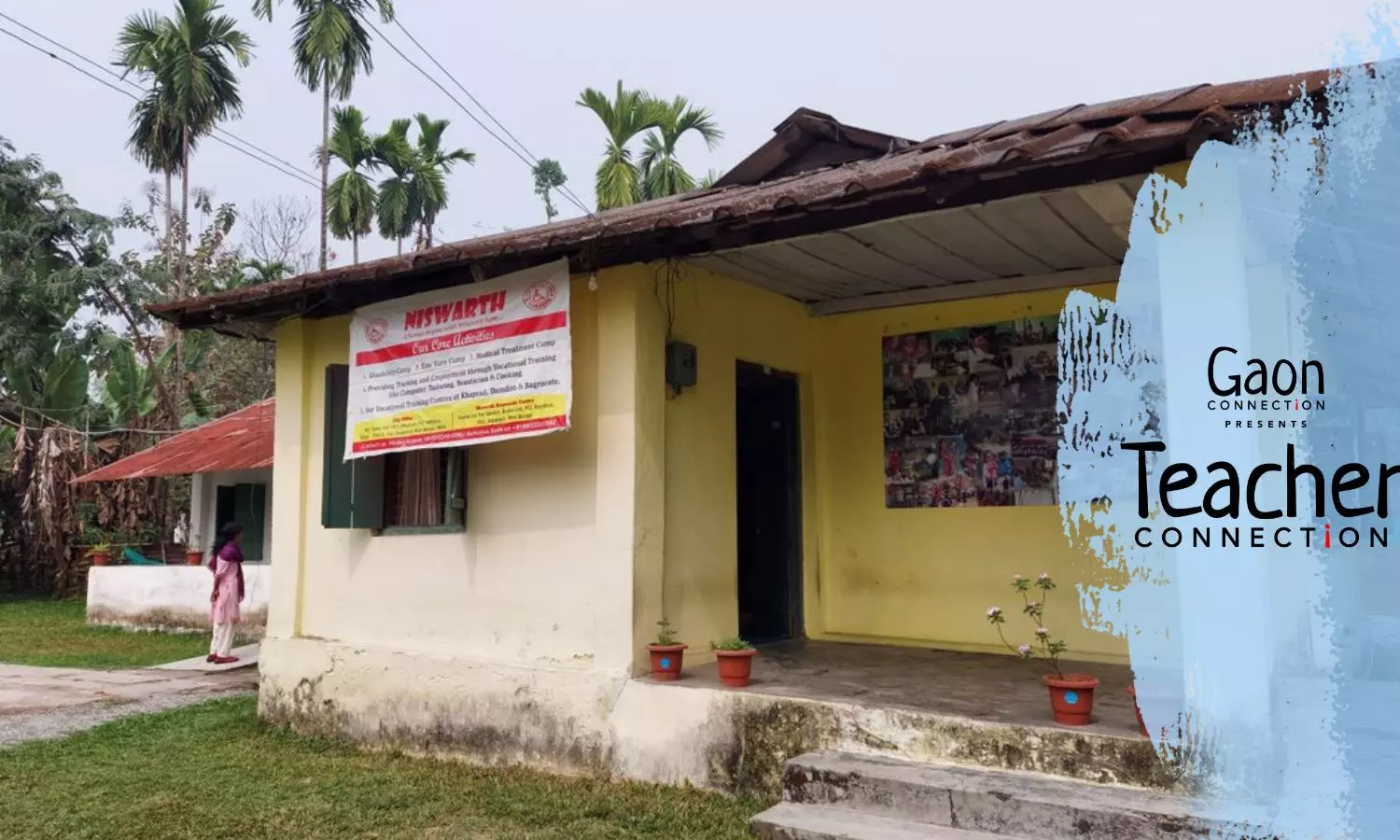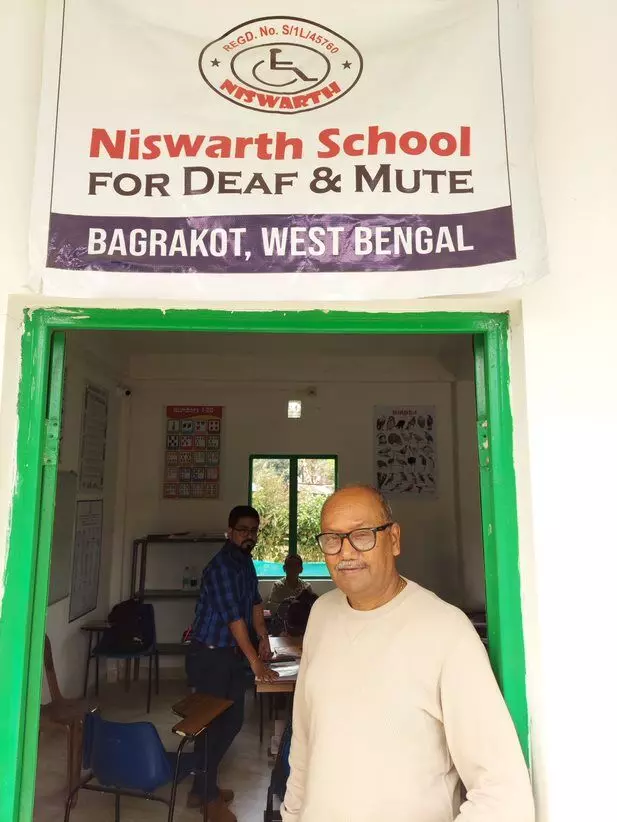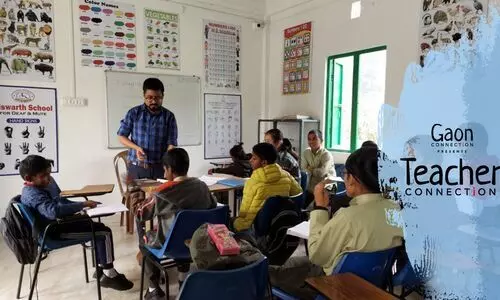Siliguri, West Bengal
Loknath Chhetri teaches at a special school in Bagrakote Tea Estate, in the sub-Himalayan Dooars region, some 50 km north-east of Siliguri in West Bengal.
“Deaf people can do anything except hear,” he messaged on Whatsapp. As I do not know sign language and 33-year-old Chhetri is speech and hearing impaired, our conversation is on WhatsApp.
“Deaf people can think and write, and gain knowledge, if they get an opportunity to do so,” said Chhetri. But, what happens is that in the remote villages in the Dooars, parents don’t know about deaf and mute schools. So, the children remain uneducated, he added.
Dooars are alluvial floodplains at the foothills of eastern Himalayas in West Bengal. The Niswarth School for Deaf and Mute, where Chhetri teaches is in Bagrakote, is one of the oldest tea estates in India set up in 1876. The once premium estate shut down in 2015, causing immense hardships to its over 1,000 workers. It reopened in 2021 under the aegis of new owners, Sammelan Tea and Beverages.
The Niswarth School for Deaf and Mute, the first English-medium school for the deaf in the Dooars, has 13 children in the age group of five and 18 years, who mostly come from the tea garden workers’ families.

In 2008, Niswarth helped organise a screening camp in coordination with the district administration. It brought together a panel of doctors, and health and administrative officials.
Also Read: Being visually challenged in no way hampers Ralal Jingar’s love for teaching
“Many deaf children here don’t go to school because there are no schools for them in the Dooars region,” said Chhetri. “Those who got admission in normal school cannot learn (well). There are a few NGOs working for hearing disability education but that is not enough,” said the teacher.
“My dream is to spread education amongst the deaf and mute children. So, I have chosen to be a teacher and teach children like me,” he said. Apart from being a teacher and computer instructor at Niswarth, Chhetri is also an activist working for the rights of deaf persons as the vice president of Jalpaiguri District Association of the Deaf.
“We want to make sign language the 23rd official language of India. It is time to educate people on the Indian sign language,” he said.
Teacher with a mission
Born in Birpara in Alipurduar district of West Bengal, Chhetri has been deaf since birth. He studied at The Salvation Army Home and School for the Deaf in Darjeeling, over 150 km away from his home. After matriculation in 2006, he went to CSI Higher Secondary School for the Deaf in Chennai where he finished his Class XII in Commerce.
He came back home and acquired a graduate degree in commerce through distance education from Indira Gandhi National Open University in 2016. Apart from learning the Indian Sign Language, he also did a basic course on computers.
In 2022, he obtained a Diploma in Education in Special Education (Hearing Impairment) from North Bengal Handicapped Rehabilitation Society with a goal to teach children who like him could not hear or speak, but unlike him did not have the opportunities or means to acquire appropriate education.
Pushpa Rai of Baradighi Tea Estate, about 50 km from Bagrakote, makes it a point to get her daughter Priti to Niswarth school every day. Hard of hearing, Priti also has Down Syndrome.
“My daughter really enjoys her time at school. She just won’t miss even a day for anything,” said Rai, who waits outside the school till school gets over. It takes about two hours and two or three changes of transport—usually shared vehicles— for them to commute one way, but they make it a point to show up for Chhetri’s classes every single day.
There are 13 students enrolled in the school at the moment. “There is a lot of interest from parents from remote areas,” said Sanjana Sarkar, secretary at Niswarth. “But commuting is a major problem here. Once we have a hostel, we will be able to take in more kids,” Sarkar added.

In 2008, Niswarth helped organise a screening camp in coordination with the district administration. It brought together a panel of doctors, and health and administrative officials.
Tea-growing areas are usually in remote places and transportation is not readily available. Besides, disabled children always need to be accompanied by someone. So, a family member is required to spend a lot of time, effort and money to take kids to school.
Also Read: A teacher has trained over 30,000 girls in self-defence
Planter with a vision
Chhetri mission of teaching hearing and visually impaired children in Dooars would not have got a push without Harsh Kumar. It was last year that Kumar, a former manager of the Bagrakote Tea Estate, founded the Niswarth School for Deaf and Mute.
The year 2005 became a turning point in Kumar’s life owing to a stroke that left his late wife, Neelam Kumar, unable to speak. They began to take a keen interest in people with hearing and speech disabilities. In 2006, the Kumars together founded a non-profit organisation called Niswarth to work in the area of hearing disability in the tea belt, which has a large tribal population. Kumar’s wife passed away in 2008, but he stayed the course. Help, financial and otherwise, came in from relatives, friends and well-wishers.
Kumar realised early on that for the differently-abled people in the tea belt, the first major struggle was in acquiring disability certificates from the government.
“A disability certificate is a very important piece of document for people with disabilities as it helps them avail of several government schemes, such as free rail travel,” Kumar told Gaon Connection. “People had to travel really long distances to the district headquarters, multiple times to get the certificates. Touts took advantage of the situation. Not surprising that in our survey of Bagrakote tea estate alone, only 27-28 people had disability certificates. About 160 disabled people did not have any because they could not travel,” he added.
In 2008, Niswarth helped organise a screening camp in coordination with the district administration. It brought together a panel of doctors, and health and administrative officials.
“Seven hundred people registered at the camp, 300 certificates were given out,” Kumar recalled. Since 2008, the organisation has helped more than 4,500 differently-abled people from the tea-growing regions of North Bengal and Assam to get their certificates from the government.
Niswarth then began to offer vocational courses, such as tailoring, cooking and beautician, apart from sponsoring the education of some deaf children from Dooars at Darjeeling’s Salvation Army School.
“But I wanted more,” said Kumar. “Why should the deaf persons of our region be content with just getting by with their lives? Why can’t they dream of something big? Why can’t they get into IITs, become engineers?” he asked.
School with a difference
It was then that the idea of starting an elementary school took shape, and last year, Niswarth opened doors as the first English-medium school for the deaf in the Dooars.
“It was a conscious decision to go for an English-medium school where children can learn computers and the Indian Sign Language, among other things,” Kumar explained. “So that people with hearing disabilities are not limited to blue-collar jobs, and can aim for better-paying opportunities in this world of electronics and digital technology, which mostly runs on English language.”
The knowledge of English and computers opens the doors to many professions. They don’t have to limit themselves to working on shop-floors or doing other semi-skilled, less-paying jobs, the founder of the school pointed out.
Shibaji Panda, director and founder at Happy Hands School for the Deaf in Odisha and a long-time activist for the deaf in India, has hailed the initiative of Niswarth. “The English-medium idea is excellent,” he said in an email to Gaon Connection.
“There are specific research facts available about English-only movement for the deaf learners. Deaf children find it easier to learn English than a language with complex morphological structure, as is typically the case for other Indian languages. If adequate access to English is possible locally this idea will really work very well,” wrote Panda.
Recognition and promotion of sign language, according to both Chhetri and Panda, is a crucial step in addressing the problem faced by the deaf. “We first need to recognise that deafness is primarily a language development problem and not a medical problem,” said Panda, a former lecturer at the University of Central Lancashire.
“That is, the extent to which deaf children can be helped to hear sound is much less important than the extent to which they can be helped to fully acquire a first language [in most cases, a sign language]. A guaranteed and complete first language acquisition must be recognised as a human right for deaf children because all further cognitive development and learning depends on this. This recognition needs to be reflected in educational policies in order to make a substantial difference to the current situation,” he said.




















